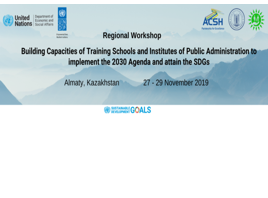
To contribute to developing the capacity of public servants to embrace the principles and values of the 2030 Agenda and the SDGs in their daily work, UNDESA, through its global initiative, is engaging with schools and institutes of public administration to mobilize and equip public servants for implementing the 2030 Agenda for Sustainable Development and attain the SDGs as well as developing and updating their curricula to reflect the SDGs and the key principles and objectives of the 2030 Agenda.
The overall purpose of the initiative was to develop the capacities of public servants (in terms of knowledge, skills, attitude, leadership competencies and mindset) to support the implementation of the SDGs, provide data and information about development of capacities in the regions; and support institutional capacity development for improved public service delivery as well as North-South and South-South exchange of effective governance practices to ensure cross-fertilization and mutual learning.
Against this backdrop, UN DESA’s Division for Public Institutions and Digital Government, with the support of the “Government for Citizens” Public Corporation” NJSC and in collaboration with UNDP, UNITAR, the Astana Civil Service Hub and the Academy of Public Administration under the President of the Republic of Kazakhstan, organized a workshop to build capacities of training schools and institutes of public administration to implement the 2030 Agenda and attain the SDGs.
This workshop provided also an opportunity to include the 2030 Agenda and SDGs among the parameters for accrediting training programs in public administration and to place the training on the 2030 Agenda and SDGs on a sustainable footing. The event provide as well a platform for sharing expertise in training and education of public servants among participating countries and contribute to North-South and South-South cooperation. Read more
 Добро пожаловать в ООН!
Добро пожаловать в ООН!